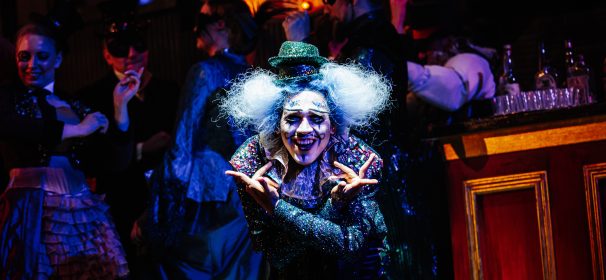October 1928 in Oxbridge and in London.
Act I
Three female voices, Mary Beton, Mary Seton and Mary Carmichael, present a case: a woman must have money and a room of her own if she is to write fiction. A group of male authorities disrupts the scene. Mary Beton explains that in all the centuries preceding, everything a woman had was in fact her husband’s property.
And what kind of books do men write about women? A young man asks why women are so much more interesting to men than men are to women. The three Marys make clear what economic independence means for a woman: hatred and bitterness cease; the ‘freedom to think of things in themselves’! The public applauds: ‘In a hundred years, women will have ceased to be the protected sex’.
Act II
The three Marys debate with a professor: is it impossible to imagine a woman could have written the works of Shakespeare? Mary Carmichael insists on entertaining this thought. So Judith, William Shakespeare’s imaginary sister, recounts her flight from her parents’ house: driven by her gift, she is attracted to the theatres in London. But there she is rejected and finally commits suicide.
But if Judith really had been allowed to write, wouldn’t it have been inevitable that her works would be ‘twisted and deformed’ because she lived in a society that so supressed women? Because the world’s indifference towards women who write is actually hostility: ‘Write? What’s the good of your writing?’ Finally, they relate this to women composers. Since today, in the year 1928, you can actually read in a recently published book: ‘A woman’s composing is like a dog’s walking on his hind legs. It is not done well, but, you are surprised to find it done at all.’
Act III
Mary Seton and Mary Beton discuss Mary Carmichael’s authorship: if she really writes as a woman who has forgotten that she is a woman, her text can be full of that sexual quality which comes only when sex is not aware of itself. To illustrate this, Mary Beton invents an image of a sudden stillness in the middle of a busy street in London: a young man meets a young woman and climbs into a taxi with her. That’s all – a metaphor for the ideal balance between the two powers in every human being. Only Mary Carmichael insists: ‘Women have always been poor!’
Then they start the peroration by provoking the attending women: how come they have never done something momentous like discovering America or writing the works of Shakespeare? The women defend themselves: they had enough to do with bearing and nurturing children… Finally, Mary Beton comforts them: the author, about whom she told them, who had never written a word: she is alive, she is only awaiting ‘the opportunity to walk among us in the flesh’.




